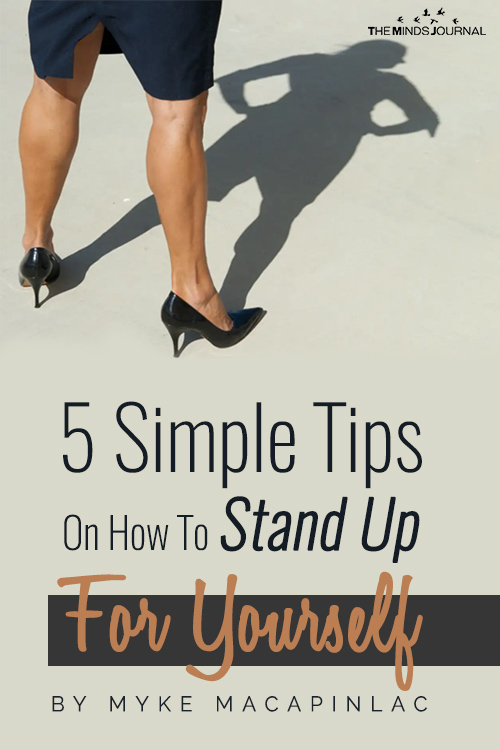How often do you fight for other things or people? And how often do you fight for yourself? Standing up for yourself is a pretty tough skill that many of us need to adopt. It’s an assertive act wherein you know who you are and how you want others to treat you. You’re the only one who can set the tone for how people treat you.
If you’re tired of people walking all over you then you need to figure out how to stand up for yourself. Today, I want to share with you the exact same process that I’ve used to stop people-pleasing and command respect from others.
I know sometimes, it’s just easier to go with the flow to avoid any potential conflict. But if you let people treat you poorly, you’ll decrease your feelings of self-worth over time.
That’s why learning how to stand up for yourself without being rude is one of the best things that you can do to improve your self-image. Every time you speak up and go for what you want, you build your confidence and courage more and more.
That being said, here are 13 actionable tips that you can implement right away.
1. Stop Feeling Guilty
Most people who have been passive for so long feel uncomfortable asserting themselves. Because they’re afraid of hurting people’s feelings, they just willingly let things slide.
First of all, let’s get something clear here.
Being able to stand up for yourself isn’t about being aggressive or being a jerk. It’s about asking for what you want in a manner that still respects others.
That’s why you have to get comfortable with the idea of it because you’re not doing anything wrong.
Remind yourself that your needs are valid. You’re not a horrible person for asking for what you want. You have to stop feeling guilty especially when you know that whatever you’re requesting isn’t unreasonable.
If you’re tired of not getting what you want, start taking responsibility for yourself. Reclaim your power back and take charge of your own life.
2. Set Your Boundaries
If you’re wondering how to be assertive without being rude, you have to know yourself well. You have to decide what’s acceptable and not acceptable for you.
Take the time to clarify what your boundaries are.
If you haven’t already, I recommend you adopt a journaling practice. Writing down your thoughts and feelings can be very therapeutic.
Not only that, you’ll have something tangible that you can refer to when defining your preferences. By knowing what you like and don’t like, it’ll be much easier for you to figure out how to stand up for yourself.
If you’re not sure what to start, what I want you to do is to pay attention to your emotions. Check-in with yourself and notice what sits well with you and what doesn’t. Typically, you feel good when you’re acting in alignment with what you want. Whenever you feel bad, that’s a good sign that there’s something off and you need to do something differently.
Again, instead of suppressing your emotions, let your feelings guide you as you set your boundaries.
3. Validate Yourself
From what I’ve noticed, most people who don’t know how to stop people-pleasing don’t feel good enough on their own. They seek validation from others instead of giving it to themselves.
If you’re wondering how to stand up for yourself, you need to affirm your worth. One of the best ways to do this is to notice how you talk to yourself.
Are you being mean and discouraging or are you being loving and compassionate?
By talking to yourself in a more positive way, you’ll gain the confidence to speak up. As a result, you won’t put up with bullshit from others as well. Unless you do this, you will always attract abusive people into your life.
Remember, the way you treat yourself will set the tone for how others treat you as well.
Read: Do You Have to Love Yourself Before You Can Love Someone Else?
4. Be Courageous
The fear of rejection holds most people back from going for what they want. They have this exaggerated version of what failure looks like that cripples them from taking action.
If you want to know how to stand up for yourself without being defensive, you have to develop your courage.
You have to say what you mean and mean what you say. Remember, people can’t read your mind. If you don’t speak up, how else are they supposed to know what you’re thinking? To help you mitigate your fears, try to assess your situation more objectively. Figure out what the best and worst-case scenarios are. And then do what you can to prepare for them.
By acting in alignment with what you want, you’ll raise your self-esteem and overcome the fear of being judged inevitably.
Read: 17 Times The Women Of Game Of Thrones Showed Us What Courage Means
5. Work On Your Timing
Having a difficult conversation is not always the easiest thing to do. That’s it’s important that you work on your timing.
Before you do anything, take into consideration the other person’s situation and state of mind. Are they preoccupied with something or are they able and willing to listen to you?
Don’t get carried away by your emotions and just blurt out what you want to say on the spot. Instead, schedule time in advance to find the right moment to resolve whatever the issue is.
6. Improve Your Delivery
Effective communication is important when learning how to stand up for yourself. This is especially true if you’re not used to confronting others.
What you want to do is to brainstorm situations that you feel like you want to be more assertive. And then, get everything out of your head by writing what you want to convey.
Remember, it’s much easier to analyze your thoughts when you can see them on paper. It also keeps you on topic and prevents you from rambling on.
You can also rehearse what you want to say in front of the mirror. If you want, you can role-play with a friend as well. Just make sure the person who’s helping you out isn’t a pushover. That way, you can get the proper feedback that you need.
Remember to work on your non-verbal communication by standing up straight, taking up space, and projecting your voice.
To sound more confident, speak from your stomach, not from your throat. By practicing ahead of time, you’ll dramatically improve your delivery. As a result, you’ll be able to communicate yourself more clearly during uncomfortable situations.
7. Keep Your Cool
I don’t know about you but I don’t like being yelled at even if I’m wrong. That’s why whatever you do, always remain calm especially during a confrontation. Nothing will get resolved once you start raising your voice and using profanity.
Also, remember to use more “I” statements. That way, you don’t sound like you’re accusing whoever you’re talking to.
For example, you can say “I feel unimportant when I get interrupted when I’m saying something.” You don’t want to say “You’re making me feel unimportant whenever you interrupt me.”
Do you see how that works? It’s a subtle shift in what you say. But it can have a profound impact on whoever receives it.
Taking ownership of your thoughts and feelings will make the other person less defensive. As hard as it may be, keep your cool by taking deep breaths to relax your body. Make an effort to maintain a friendly tone when you speak as well. By doing this, you’re a lot more likely to have a productive conversation.
8. Learn To Say No
If you feel stressed and worn out, then you need to stop putting other people’s needs ahead of you.
Remember, you can’t give what you don’t have. That’s why you have to always make yourself a priority.
You shouldn’t have to suffer at the expense of others. Not to mention, time is your most valuable resource because you can’t make more of it. That’s why you have to be mindful of your commitments. For example, if someone is asking you to go out late at night and you don’t want to, then politely say it.
Remind yourself that you don’t owe anyone anything and it’s okay to be selfish. If saying no feels difficult for you, try delaying your response. When someone makes a request, tell them you want to think about it and that you’ll get back to them.
That way, you’ll be able to assess if what they’re asking for is something you want to do or not. By doing this, you’ve bought yourself time and removed any pressure from saying yes automatically.
Read: 12 Self-Care Tips to Take Better Care of Yourself
9. Agree To Disagree
I know it sounds obvious but we’re all different. We each have our unique personalities and our own life experiences. That being said, doesn’t it make sense that we’re not always going to see eye-to-eye on certain things?
In those cases, we can just agree to disagree.
For example, my brother and I have our own methods of staying in shape. He likes CrossFit and I like doing Reverse Pyramid Training. He enjoys a high-fat diet and I prefer eating carbs.
One’s not necessarily better than the other. It’s about whatever works and what gets the job done. On that note, you don’t need to talk about a particular topic or do a specific activity if it causes friction and tension.
You like what you like and that’s totally okay. You don’t need to explain or justify yourself to others.
This is where knowing yourself really comes into play. You can just do your own thing and you don’t have to get into an argument with others about it.
10. Pick Your Battles
The truth is, you’re not always going to get what you want. Knowing how to stand up for yourself also means you have to get good at managing your expectations.
If there’s an issue and it’s a one-time thing, then it may not be worth the confrontation. But if it’s something that happens regularly, then you definitely want to address it.
Remember, healthy relationships are filled with understanding. You have to be willing to compromise and meet people halfway. By having an open mind, you’ll be able to find a win-win situation that works well for everyone involved.
Read: 3 Wrong Ways To Love Yourself And How To Do It Right
11. Try To Understand Others
A lot of times, conflict happens when we don’t understand each other. Before you let yourself get all worked up, make sure you’re not making any assumptions.
Don’t create stories in your head without real facts to back them up. That’s why a big part of figuring out how to stand up for yourself is empathy.
I know it’s difficult but you have to be able to put yourself in other people’s situations. Make an effort to consider where they’re are coming from and clarify any miscommunication.
When in doubt, don’t be afraid to ask questions to see their point of view. Listen to what they have to say and genuinely try to understand. That way, you’ll have a complete picture of whatever the situation is. As a result, you can be more strategic with the decisions you make.
Read: I Grew To Understand That People Don’t Always Build Walls To Keep Others Out
12. Start With Small Requests
Just like any skill, learning how to stand up for yourself will take time. It won’t happen overnight that’s why you have to be patient with yourself. My advice is for you to seize every opportunity to practice being assertive.
For example, let’s say you’re at a restaurant and they messed up your order. If that’s the case, politely ask to get them to remake your meal the way you want it. Let’s say you want tacos instead of sushi for dinner, then say that. If you’re at the bank waiting to speak to a teller and someone cuts in front of you, calmly tell them to go to the back of the line.
Again, this is not about you always getting your way. But if you don’t ask, then you won’t receive. Over time, you’ll develop your confidence to take even bigger risks to go for things that really matter to you.
But you have to start with making small requests first so you can practice. That way, you’ll also get some quick wins.
13. Change Your Environment
If you’re having trouble figuring out how to stand up for yourself, then you might want to re-evaluate your relationships.
Remember, you can’t change other people and that’s not your responsibility as well. There are those who are always negative, want to fight, and want to put you down. Sometimes having clear communication isn’t always possible with those individuals.
When a relationship becomes toxic, you have to recognize when it’s time to let people go. This is especially true if you’ve made multiple attempts to fix the issue. And you know what, that could mean losing friends, family members, or even a significant other. But if you don’t do it, then you risk the chance of losing the respect that you have for yourself.
At the end of the day, you never want to have to compromise on things that are important to you.
Conclusion
I just showed you an actionable game plan if you want to learn how to stand up for yourself. Apply these tips as much as you can if you want to develop your assertiveness.
And now, let’s turn it to you.
Which one of these tips are you going to implement first? Are you going to work on your timing or on improving your delivery?
Leave me a comment below and let me know.
Written by: Myke Macapinlac
Originally appeared in: Social Confidence Mastery










Leave a Reply
You must be logged in to post a comment.